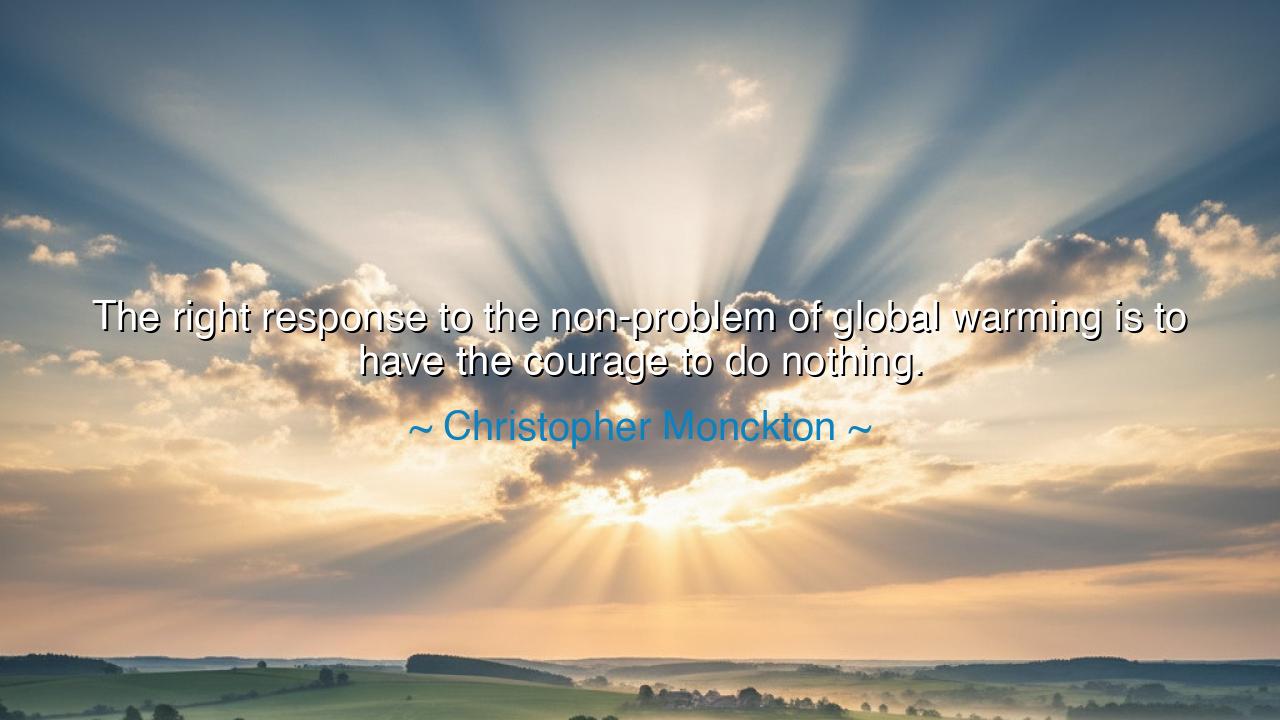
The right response to the non-problem of global warming is to
The right response to the non-problem of global warming is to have the courage to do nothing.






In the tone of defiance against the prevailing winds of fear, Christopher Monckton, a British commentator and skeptic of mainstream climate science, once declared: “The right response to the non-problem of global warming is to have the courage to do nothing.” These words, provocative and bold, arose from his conviction that humanity was being swept into hysteria — that governments, corporations, and citizens were reacting not to evidence but to panic. Whether one agrees or not, his statement holds a deeper meaning: it is a reflection on courage, restraint, and the wisdom to discern when action itself becomes folly.
Monckton’s words were born amid the storms of public debate over climate change, at a time when the world was turning its eyes toward policies, taxes, and technological upheavals designed to combat it. To him, the greatest danger was not the warming of the planet, but the cooling of reason — the surrender of judgment to fear. When he spoke of the “courage to do nothing,” he did not mean apathy, but intellectual bravery: the strength to stand apart from the crowd, to resist the demand for movement when one is not yet sure of the path. His was a voice echoing an ancient truth — that not all action is wise, and that sometimes wisdom lies in stillness.
The ancients, too, knew this lesson well. The philosopher Socrates, when urged to flee his death sentence, refused to act rashly, choosing instead to remain faithful to principle over panic. His stillness became his triumph. Likewise, in the Taoist tradition, Lao Tzu spoke of Wu Wei, the art of effortless action — of knowing when to allow the natural order to unfold without force. Monckton’s sentiment, though wrapped in modern controversy, carries the same root idea: that courage is not always motion, but sometimes the calm refusal to be moved by fear or deception.
To “do nothing” in this sense is not sloth or denial, but discipline. It is to question whether human efforts are guided by truth or vanity, by understanding or impulse. History is filled with moments when nations, seized by panic, acted unwisely — when in the name of safety or progress, they forged chains for themselves. Consider the witch trials of Europe, when fear of the unseen led to cruelty against the innocent. Or the wars waged in the belief of false threats. In every age, the cry for action has often drowned out the quieter voice of reason. Monckton’s warning, though addressed to climate policy, belongs to this larger human struggle: to remain steady when the world demands haste.
Yet, one must not mistake his defiance for indifference. Even in opposition, his words urge a kind of moral courage — the courage to think independently, to resist the ease of consensus. For it is far easier to follow the multitude than to stand alone in skepticism. Many are driven by the comfort of belonging; few are driven by the discipline of truth. Monckton’s stance, right or wrong, calls upon the listener to seek evidence, not emotion; to act not from fear, but from conviction grounded in knowledge.
Still, the quote stirs an uneasy question — what if “doing nothing” becomes an excuse for complacency, for ignoring real suffering or danger? Here lies the paradox of courage itself: it is not found in mere rebellion, but in the balance between action and restraint. The wise do not act simply because they can, nor refrain simply because they doubt. They discern the moment when intervention serves life, and when it merely serves pride. Thus, while Monckton’s words challenge the urgency of global alarm, they also challenge us to reflect — to know why we act, and whether our actions spring from clarity or confusion.
Let this then be the lesson to the generations that follow: courage is not only in marching forward but also in standing still when truth demands patience. Whether one believes in Monckton’s “non-problem” or not, his call reminds us to seek wisdom before movement, understanding before policy, truth before noise. The world is ever eager to act; few are brave enough to pause.
For as Christopher Monckton teaches in his defiant phrase, sometimes the hardest act of all is to do nothing — not out of apathy, but out of fidelity to reason. When fear shouts for haste, let the wise be calm. When crowds demand agreement, let the thoughtful stand firm. And when the world trembles at shadows, let courage be found not in motion, but in clarity of mind — the still flame that neither wind nor doubt can extinguish.






AAdministratorAdministrator
Welcome, honored guests. Please leave a comment, we will respond soon